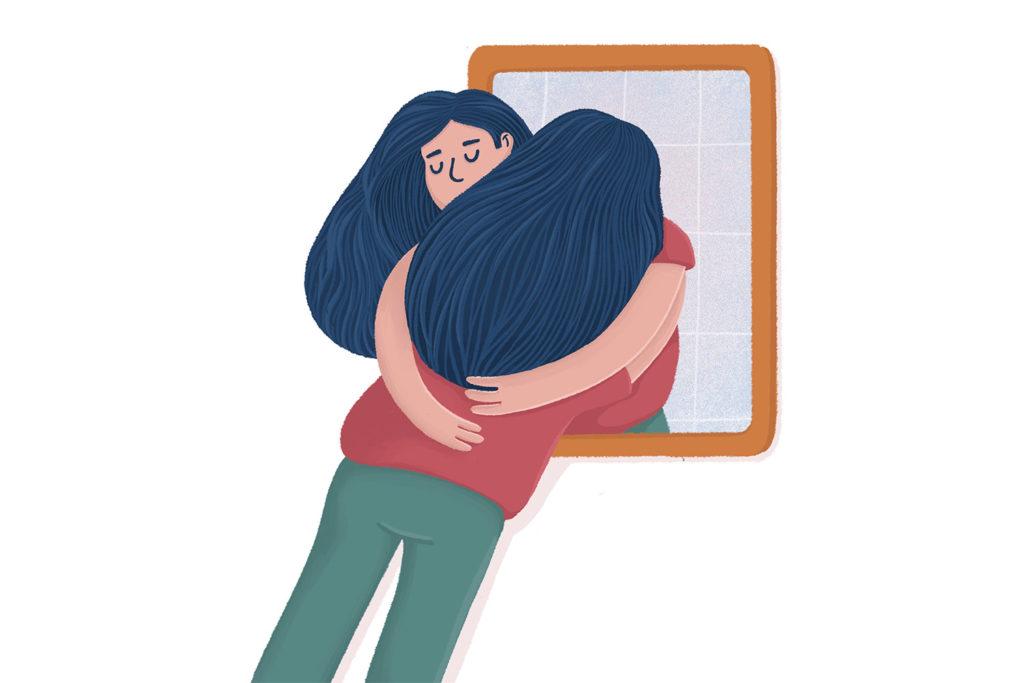Second To Nature Encourages You to Take Extra Care of Yourself
This month, Second to Nature shares examples of self-care during breast cancer treatment. In September, we reviewed how loved ones can show their support to breast cancer patients. Whether it’s advocating, doing chores, providing childcare, showing sympathy, or attending events, cancer patients appreciate receiving others’ support and care.
Having that support system is certainly important for patients … but so is patients committing to self-care. Some people hear “self-care” and think, “Am I being selfish to do that?” No way! Self-care isn’t selfish. It’s simply making sure you have what you need to function. Some simple, yet necessary, examples of self-care include a healthy diet, regular exercise, good sleep, and trying to lower stress.
Eating a Healthy Diet
Whether you have any existing medical conditions or not, a healthy diet is a crucial example of self-care for everyone. For patients undergoing breast cancer treatments, this is doubly important. Cancer treatments often drastically impact the immune system, which the digestive tract primarily controls. The human immune system works to find and attack germs.
Chemo, Calories, and a Healthier Balance
Chemotherapy and radiation can negatively impact the immune system blood cells for a short period of time. A weakened immune system means patients can easily get sick. A diet of whole grains, fruit, and vegetables, plus foods with probiotics, boosts immunity by keeping the intestinal tract healthy.
Furthermore, chemotherapy and radiation are known to affect a patient’s appetite and taste buds. Patients whose appetites decrease or whose taste buds change due to treatments should eat smaller meals as often as they can. It’s also best that such patients don’t lessen their appetite by drinking lots of liquids before or during meals. Generally, nutritionists recommend eating five to six small meals or snacks daily, rather than three large meals for self-care.
Foods To Eat
Fruits, vegetables, whole grains, and low-fat foods and drinks are easier on the digestive system. This is as true for breast cancer patients as it is for every person. Breast cancer patients should avoid acidity, though, to minimize nausea. Eat strawberries, blueberries, and cantaloupe rather than oranges, pineapples, and grapefruits. Milkshakes, smoothies, or juices are OK if a patient is unable to fully digest solid foods. Soups are also a great option!
Pay attention to sugar content
Not everything “diet” is truly “diet,” and artificial sweeteners have their drawbacks. True, there’s no scientific proof that a sugar-free diet lowers the cancer risk, nor do artificial sweeteners actually cause cancer. That being said, artificial sweeteners can be hundreds of times sweeter than actual sugar. Artificial sweeteners trick your brain into thinking that you’re actually consuming sugar, which can trigger your sugar cravings. If a healthy diet includes the choice to lower sugar intake, consider lessening artificial sweetener consumption, too.
Try to Exercise Regularly
A healthy diet is only one part of consistent self-care. If a patient’s going to eat healthier, he or she may as well exercise regularly, too, right? Again, not only is this recommended self-care for every person, it’s especially important self-care for breast cancer patients.
Benefits of Staying Active
Doing something active can increase your appetite, which helps if the breast cancer treatment depletes hunger. Furthermore, according to www.cancer.gov, a 2020 National Cancer Institute study linked exercise to longer survival of high-risk breast cancer. The study also found that exercise lowers the risk of breast cancer relapses by helping to maintain a healthy weight. It also eases treatment side effects and boosts energy.
Exercise Can Be Simple
Start out easy by doing some stretches. Stretching helps maintain physical mobility. By doing some calf, hamstring, arm, neck, and back stretches, patients can at least stay flexible. Walking is another easy exercise; whether around the block, on a treadmill, or even while grocery shopping. The American College of Sports Medicine recommends cancer survivors walk 150 minutes per week. A walk every day adds up to only 21.5 minutes each time. With regained strength and energy, patients can advance their self-care choices to exercises like low-impact aerobics and lifting weights.
Find the Right Balance of Good Sleep
Self-care also means getting a healthy amount of good sleep. Medical professionals all agree that sleep impacts nearly every system of the body, among them immune, digestive, and cognitive. Since good sleep is so important in maintaining one’s overall health, it can particularly affect cancer in various ways.
The National Cancer Institute defines cancer as “a disease in which some of the body’s cells grow uncontrollably and spread to other parts of the body.” Sleep impacts how all cells in the body function. How much or little sleep a person gets can affect the cells’ environment or the signals that affect the cells’ growth.
Lack of Good Sleep
According to www.sleepfoundation.org, “in animal studies, sleep deprivation was linked to increased wear-and-tear on cells.” This potentially leads to the kinds of DNA damage that could lead to cancer developing. Lack of sleep also impacts the immune system; therefore, it contributes to issues like chronic inflammation. Inflammation is also believed to increase cancer risk. The Centers for Disease Control says that not getting enough sleep can lead to serious problems for people with cancer. They can experience lower quality of life, depression, and an incapability to participate in day-to-day operations.
Too Much Sleep is Not Good Sleep
On the other side, too much sleep can also be troublesome. Researchers define “too much sleep” as long sleep duration, more than nine hours per night. According to www.sleepfoundation.org, long sleep duration potentially links to cancer risk. The website notes that one study indicated sleeping more than nine hours a night contributed to a higher risk of death from breast cancer in diagnosed women. Current guidelines from the National Sleep Foundation state that teenagers need eight to 10 hours of sleep per night, adults need seven to nine hours, and seniors seven to eight hours.
How to Have Consistently Good Sleep
According to the CDC, among the best ways to improve a person’s quality of sleep include:
-
- Soaking up morning sunlight. Sunlight increases melatonin levels, which is an important hormone for sleep.
- Exercising. Daily physical activity can help people fall asleep more easily.
- Going to bed and getting up at the same time every day, including on days off from work.
- Making sure the sleeping area is quiet, dark, relaxing, and at a comfortable temperature.
- Keeping electronic devices turned off at bedtime, such as TVs, computers, and smart phones. Better yet, consider removing them from the bedroom!
- Not consuming large meals, caffeine, and alcohol before going to sleep.
Strive to Lower Your Overall Stress
Getting good sleep, eating a healthy diet, and doing exercise can also help to lower stress. The National Cancer Institute defines stress as “the body’s response to physical, mental, or emotional pressure. Stress causes chemical changes in the body that can raise blood pressure, heart rate, and blood sugar levels. It may also lead to feelings of frustration, anxiety, anger, or depression … Long-term … or high levels of stress may lead to mental and physical health problems.” Managing stress is an everyday part of self-care, but trying to lower stress while undergoing cancer treatments is essential. You can:
-
-
Do Enjoyable Activities
-
One of the easiest ways to lower stress is doing an enjoyable and pleasurable activity. Whether playing a game, binge-watching a favorite show, or taking a bath, pleasure lowers stress. Partaking in pleasurable experiences hinders the brain’s anxiety responses and levels off cortisol. Cortisol is a natural stress hormone in every brain. While its release is necessary in a dangerous situation, too much of its release is physically and psychologically harmful. Pleasure often releases endorphins into the brain, which lowers excessive cortisol levels.
-
-
Get Help with Financial Issues
-
Cancer therapies and surgeries are expensive. They can also result in household income changes; patients often can’t work while undergoing or recovering from treatments. It’s okay to get help with paying for these things or even for day-to- day expenses. Many times, churches collect offerings, and community organizations do fundraisers. There’s also help available from the American Cancer Fund, the Cancer Financial Assistance Coalition, and CancerCare.
-
-
Ask For, and Accept, Support
-
No one can do it all, especially while battling cancer. Patients and their families shouldn’t be afraid to or concerned about asking others to support them on their journey. Maybe, a neighbor is a good cook; ask him to make the family’s favorite meal. Perhaps, an extended family member keeps a clean house. If asked, she can help tidy up the patient’s home one day. When or if loved ones show support by offering these services, patients should graciously accept their help. We also recommend joining and participating in a support group of people who understand the cancer journey themselves.
Give Second To Nature a call at (540) 366-2711 for information about our services. We specialize in custom breast prosthesis and mastectomy education. Follow us on Facebook for updates. We’d also be happy to talk more with you about other examples of self-care during breast cancer treatment.

